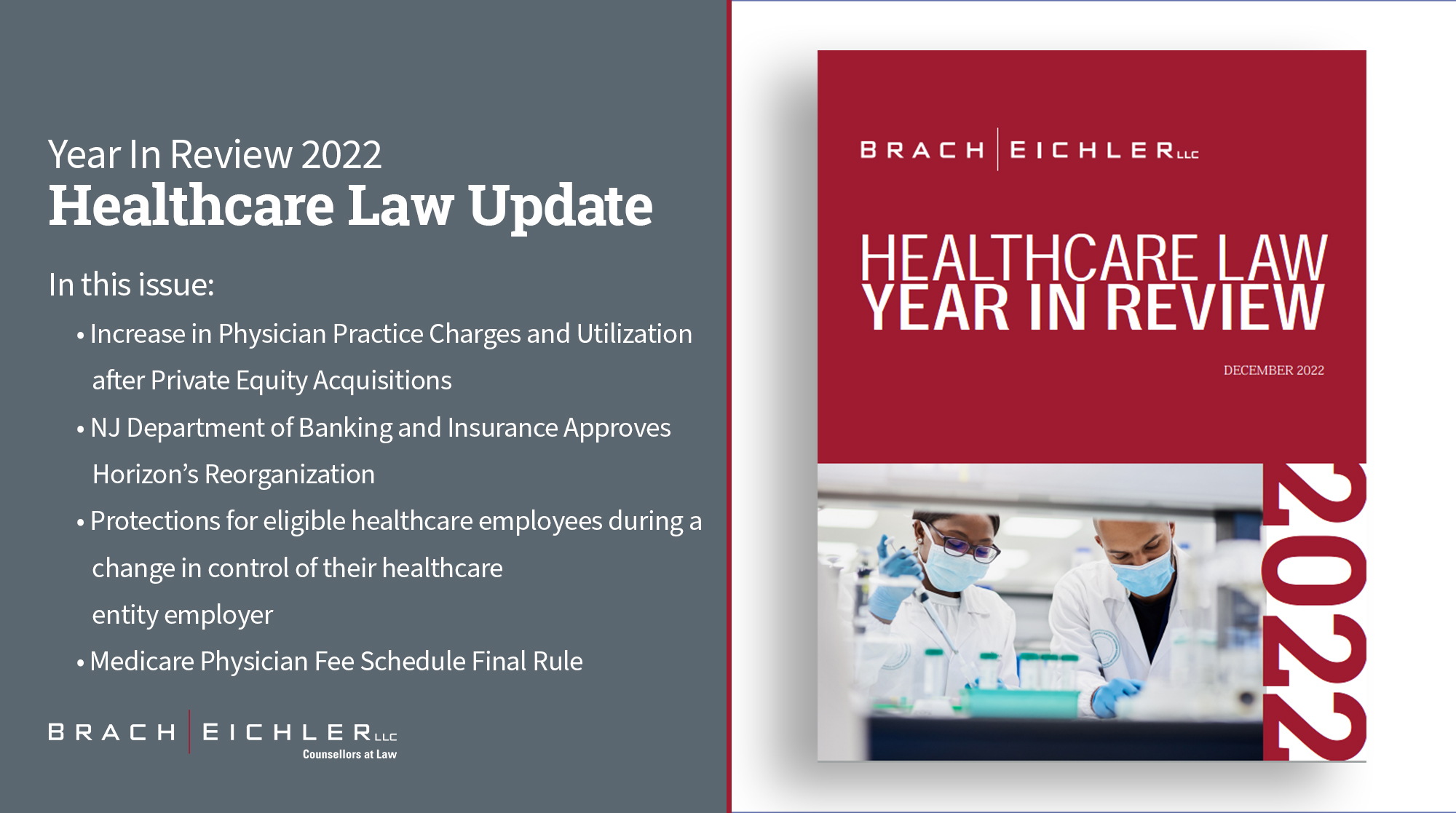
HAPPY NEW YEAR! We are pleased to introduce our 14th annual Healthcare Law Year in Review produced by the Brach Eichler Healthcare Law Practice. The goal of this publication is to highlight some of the most important issues and developments in healthcare, both nationally and in New Jersey, over the past 12 months.
Thanks to our Healthcare heroes, 2022 was a year where we finally started to see some normalcy of life as we knew it. This year’s edition takes an inside look at the unique challenges to healthcare providers due to unpredictability and a rapidly changing environment. Last year presented steep learning curves, demanded reinvention, and fostered creative opportunities to adjust and adapt.
As we begin 2023, we continue to expect to see significant shifts in the healthcare industry. Among the issues covered in the report are:
• Increase in Physician Practice Charges and Utilization after Private Equity Acquisitions
• NJ Department of Banking and Insurance Approves Horizon’s Reorganization
• Protections for eligible healthcare employees during a change in control of their healthcare entity employer
• Medicare Physician Fee Schedule Final Rule
As always, Brach Eichler’s healthcare law attorneys are available to provide guidance and/or assist with mergers and acquisitions, labor and employment, contracts and agreements, and any other legal matters. If you have any questions or would like additional information regarding any of the articles contained in the 2022 Healthcare Law Year in Review, please do not hesitate to contact us. Thank you for your continued support. Be well, be safe.

JOHN D. FANBURG, ESQ.
Managing Member & Chair, Healthcare Law
Brach Eichler LLC
973.403.3107
jfanburg@bracheichler.com

ED HILZENRATH, ESQ.
Member, HLU Editor
Brach Eichler LLC
973.403.3114
ehilzenrath@bracheichler.com

According to a study recently published in the JAMA Health Forum, private equity acquisitions of physician practices in dermatology, gastroenterology, and ophthalmology were associated with increased health spending and utilization. The study examined charges, utilization, and practice patterns during the period between 2016 to 2020 among practices that were acquired by private-equity purchasers and non-acquired practices to determine the impact of private equity acquisitions. The study found that following a private equity acquisition, physician practices saw a 20.2 percent increase in charges and an 11 percent increase in the allowed amount per claim. Patient utilization of healthcare services grew as well, with a significant increase in the number of new patient visits, patient encounters and evaluation and management (E/M) visits.
The variations were not consistent among each specialty. For example, E/M visits rose significantly for dermatology and ophthalmology but not gastroenterology, while allowed amounts per claim increased for dermatology and gastroenterology but not ophthalmology. The JAMA Health Forum study contrasts sharply with the findings of a recent study of private-equity acquired ambulatory surgery centers (ASCs) conducted by Health Affairs, which found only slight increases in charges and utilization by ASCs between pre-acquisition and post-acquisition periods.
The Centers for Medicare & Medicaid Services (CMS) recently issued the 2023 final rule for Medicare payments under the Physician Fee Schedule (MPFS) for calendar year (CY) 2023. The MPFS updates the Medicare Shared Savings Program for CY 2023, including providing additional optional merit-based incentive payment pathways to providers under the Merit-Based Incentive Payment System (MIPS).
- The MPFS sets the PFS conversion factor at $33.06 per relative value unit (RVU), which represents a decrease of $1.55 (4.48%) from CY 2022, primarily due to the expiration of a temporary 3% statutory increase that was implemented for CY 2022 as a result of the challenges posed by the COVID-19 pandemic.
- The MPFS includes updates to codes and coding guidelines for Evaluation and Management (E/M) services, in furtherance of CMS’s efforts to reduce the administrative burden of billing for E/M services. CMS also delayed, for one year, the implementation of policies modifying how providers bill for split or shared E/M visits.
- The MPFS includes policy changes related to reimbursement for Medicare telehealth services, including providing an extension of Medicare coverage for several types of telehealth services that were made temporarily available as a result of the COVID-19 public health emergency. This includes:
- Allowing telehealth services to be furnished in any geographic area and in any originating site setting.
- Allowing certain services to be furnished via video-only telecommunications systems.
- Allowing physical therapists, occupational therapists, speech-language pathologists, and audiologists to furnish telehealth services.
- Allowing telehealth services to be furnished in any geographic area and in any originating site setting.
- The MPFS incorporates revisions to existing regulations that are intended to provide better access to behavioral health services for Medicare beneficiaries, notably by allowing certain behavioral health services administered by auxiliary personnel such as licensed professional counselors, and licensed marriage and family therapists, to be provided under the general, as opposed to direct, supervision of a physician.
- Other noteworthy highlights of the MPFS include:
- Updates to payment rates for both the drug and non-drug components of opioid treatment programs.
- Allowing Medicare beneficiaries direct access to an audiologist for non-acute hearing conditions without an order from a physician.
- Clarifying payment policies for dental services, which are covered under Medicare only when they are an integral part of specific treatment of a beneficiary’s covered medical condition.
- Expanding Medicare coverage for certain colorectal cancer screening tests, by reducing the minimum age for coverage and expanding the services included within the definition of covered colorectal cancer screening tests.
- Updates to payment rates for both the drug and non-drug components of opioid treatment programs.
Setting a new standard for whistleblower cases, the United States Department of Justice agreed to award $250,000,000 to a former Biogen, Inc. employee for pursuing a whistleblower action under the federal False Claims Act against Biogen. The former Biogen employee initiated the whistleblower claim soon after he left Biogen in 2012, alleging that from 2009 through 2014, Biogen offered and paid remuneration to healthcare professionals in the form of speaker honoraria, speaker training fees, consulting fees and meals in order to encourage the healthcare professionals to prescribe several multiple sclerosis drugs produced by Biogen, in violation of the federal Anti-Kickback Statute. The Department of Justice declined to intervene in the case.
In September 2022, Biogen and the Department of Justice agreed to a settlement of the case, according to which Biogen agreed to pay a penalty in excess of $840 Million to the Federal Government and another $56 Million to 15 States. Biogen did not admit any wrongdoing in its settlement with the Department of Justice. The $250,000,000 that the whistleblower received from the Federal Government for pursuing the case amounts to 29.6% of the amount that Biogen has agreed to pay the Federal Government, which is just under the 30% maximum award threshold for whistleblower cases under the False Claims Act that the Department of Justice declines to pursue. The award is the highest
whistleblower award ever under the False Claims Act and is believed to be one of the highest whistleblower awards ever under any government program.
On June 29, 2022, the Department of Health and Human Services, Office of Inspector General (OIG) issued Advisory Opinion 22-14 regarding four proposed arrangements where an ophthalmology practice would provide free or subsidized continuing education (CE) programs to local optometrists, including optometrists who are in a position to refer patients to the practice.
Under Arrangement A, the ophthalmology practice would charge attendees a fair market value (FMV) registration fee to attend the CE programs. Under Arrangement B, the ophthalmology practice would not charge attendees to attend the CE programs and, instead, cover the entire cost of the CE programs. Under Arrangement C, the ophthalmology practice would not charge attendees to attend CE programs but would instead solicit funding from industry sponsors such as medical device or pharmaceutical companies. Lastly, under Arrangement D, the ophthalmology practice would charge attendees a registration fee to attend the CE programs but subsidize a portion of the programs using funding from industry sponsors.
The OIG determined that Arrangement A presented low risk under the federal Anti-Kickback Statute (AKS) because attendees would be paying a registration fee consistent with FMV and sponsors would not be providing any funding for the CE programs. The OIG determined that Arrangements B and C presented a high risk under the AKS because the attendees would be able to attend the CE programs for free, and because providing free goods or services to referral sources is problematic under the AKS. Moreover, Arrangement C posed a heightened risk under the AKS because the sponsors’ subsidies could induce optometrist attendees to order the sponsors’ products. Similarly, the OIG determined that Arrangement D presented a high risk under the AKS because the sponsors’ subsidies could induce the ophthalmology practice to order the sponsors’ products.

On November 1, 2022, the New Jersey Department of Banking and Insurance (DOBI) approved an application by Horizon Blue Cross Blue Shield of New Jersey (Horizon) to reorganize its corporate structure to a nonprofit mutual holding company. The approval is subject to 11 conditions imposed by DOBI to ensure that Horizon acts in the interest of its 3.7 million members, and maintains financially safe and sound insurance subsidiaries.
Notable conditions set forth by DOBI include: i) an obligation to continue to offer comprehensive medical coverage in every New Jersey county; ii) a dividend moratorium for three years; iii) minimum risk-based capital (RBC) requirements for subsidiaries or affiliates of Horizon in excess of authorized control level RBCs; iv) a parental guarantee to maintain their minimum RBCs; and v) a requirement to submit quarterly reporting of enterprise-wide RBCs.
Horizon’s initial corporate structure restricted it from investing more than 2% of its reserves in any single venture. The reorganization lifts this restriction on Horizon’s reserves, and allows Horizon to invest more freely in nonprofit and for-profit projects. In its reorganization application, Horizon stated that, after its reorganization, it would now have greater latitude to invest in its behavioral health and critical substance abuse areas.
DOBI’s approval of the reorganization means that the state will soon receive a large influx of cash from Horizon. Horizon will pay the state an initial assessment of $600 million by June 1, 2023, and will thereafter pay ongoing annual assessments of no more than $650 million in total for the next seventeen years.
On July 29, 2022, Governor Phil Murphy signed into law Bill S1177 to amend certain aspects of the Out-of-network Consumer Protection, Transparency, Cost Containment and Accountability Act (the Act) relating to the arbitration process for claims involving health insurance carriers who are subject to the Act. Specifically, the amendments extend the amount of time that an insurance carrier and healthcare provider have to negotiate a settlement in the event of an inadvertent use of out-of-network services from 30 to 60 days, and extends the deadline for the carrier, provider, or covered person to initiate binding arbitration in the event of a failure to reach a settlement from within 30 days of the final offer to within 60 days of the final offer. The amendments also require an arbitrator to include detailed written findings with each arbitration decision. The detailed written findings are to be an analysis of the decision, including information concerning any databases, previous awards, or other documentation or arguments that contributed to the arbitrator’s decision.
On May 2, 2022, the New Jersey State Assembly introduced Bill A3715, seeking to regulate and limit the use of non-compete covenants in employment agreements. The Bill had previously been introduced in the New Jersey Senate. The Bill requires employers to provide 30 business days’ notice of the terms of the non-compete, either before commencement of employment or before the agreement is to become effective. Additionally, it requires that restrictions be no broader than necessary to protect the employer’s legitimate business interests. Notably, the Bill requires explicit written notice in the agreement that before signing, an employee has the right to consult with counsel. With respect to post-employment enforcement, the Bill:
- limits the temporal scope of non-competes to 12 months following the date of termination.
- provides that restrictive covenant agreements with employers cannot restrict an employee from performing work for a customer or client of the employer, provided that the employee does not initiate or solicit the customer or client.
- requires employers to provide notice, in writing, of their intent to enforce the non-compete no later than 10 days after termination of the employment relationship.
- contains a provision that unless employment has been terminated due to employee misconduct, the employer must pay the employee full salary and benefits for the work that would have been performed during the restricted period.
The new legislation, if enacted, would not apply retroactively to agreements entered into prior to the Bill’s effective date.
On January 10, 2022, Governor Phil Murphy signed into law Bill S3632 to expand the exemptions from restrictions on healthcare practitioner referrals and to require certain referrals to be made in accordance with specific professional standards. Under the current New Jersey law known as the Codey Law, New Jersey’s state-specific self-referral law, a healthcare practitioner generally is not permitted to refer a patient to a healthcare service in which the practitioner, the practitioner’s immediate family, or the practitioner in combination with the practitioner’s immediate family, has a significant beneficial interest. One exception to the Codey Law pertains to referrals a healthcare practitioner makes to a healthcare service in which the referring practitioner has a significant beneficial interest, when participants in an alternative payment model registered with the Department of Health make a bona fide determination that the significant beneficial interest is reasonably related to the alternative payment model standards filed with the Department of Health, provided that the determination is documented and retained for a period of 10 years. The new law narrows this exception by requiring that the referral be made in accordance with alternative payment model standards and the professional standards applicable to the healthcare service in which the referring practitioner
has a significant beneficial interest. The new law also adds an exception to the Codey Law which provides that restrictions on referrals of patients do not apply to a value-based arrangement made in accordance with federal self-referral laws, a payment model authorized under a Medicare shared savings program, or a demonstration project operated by the Center for Medicare and Medicaid Innovation. The aforementioned expansions coincide with the federal Stark Law and Anti-Kickback Statute expansions enacted in 2020 that took effect on January 1, 2022.

Effective July 1, 2022, Governor Phil Murphy signed into law Bill A3975 to protect the disclosure of patient information relating to reproductive health care services, and to protect access to health care, medical services, and procedures related to an abortion for persons who come to New Jersey from jurisdictions in which these actions are illegal. “Reproductive health care services” is defined as all medical, surgical, counseling, or referral services relating to the human reproductive system, including services relating to contraception, or termination of a pregnancy. The new law generally provides that in any civil action a medical provider is barred from disclosing the following communications or information, unless the patient explicitly consents in writing to the disclosure: (i) any communication made to the medical provider, or any information obtained by the medical provider from a patient relating to reproductive health care services; or (ii) any information obtained by personal examination of a patient relating to reproductive health care services that are permitted under New Jersey law.
On August 18, 2022, Governor Murphy signed into law Bill S315, to establish employment protections for eligible healthcare employees during a change in control of their healthcare entity employer. The law became effective on November 16, 2022. The new law defines a “change in control” to mean any sale, assignment, transfer, contribution, or other disposition of a health care entity’s assets or controlling interest, including by consolidation, merger, or reorganization.
Health care entities subject to the new law include general and special hospitals, ambulatory surgical centers, ambulatory care facilities, licensed imaging centers, public health centers, diagnostic centers, treatment centers, rehabilitation centers, extended care facilities, skilled nursing homes, nursing homes, intermediate care facilities, outpatient clinics, dispensaries, home health care agencies, and residential health care facilities. Private medical practices and governmental health care entities are not subject to the new law. Eligible employees include non-managerial individuals employed within a 90-day period immediately preceding the change in control, with the exception of individuals discharged for cause by the former employer during that 90-day period.
Not less than 30 days before a change in control, the former health care entity employer must:
- Provide the successor employer and the employee’s collective bargaining representative, if any, a list containing the name, address, date of hire, phone number, wage rate, and employment classification of each eligible employee employed;
- Inform all eligible employees of their rights under the law; and
- Post a notice setting forth the rights provided under the law, in a conspicuous location or locations accessible to all employees.
The new law requires that the successor health care entity employer must offer employment during a transitional period of at least four months following the change in control to each eligible employee, with no reduction of wages or paid time off, and no reduction of the total value of benefits, including health care, retirement, and education benefits.

During the four-month transitional period, all available employment positions must be offered in writing to eligible employees who previously held those positions and the offers must remain open for at least 10 business days. In the event that the number of available employment positions are less than the total number of eligible employees, then employment will be based on seniority and experience. An employee who is retained pursuant to the new law cannot be terminated without cause during the transitional period unless the termination is a result of downsizing, in which case priority must be given to senior and experienced employees. Further, laid-off employees must be offered any positions they held, if they are subsequently restored during the transitional period. After the transitional period, the successor employer must evaluate all retained employees and offer to continue to retain them if their performance during the transitional period was satisfactory.
The new law will not limit, delay, or prevent the recognition of a collective bargaining representative, or collective bargaining between the successor employer and the representative. Any action taken under such a collective bargaining agreement will not be considered a violation of the law.
In April 2022, the U.S. Department of Health & Human Services (HHS), Office for Civil Rights (OCR) published a Request for Information (RFI) to solicit public comments on certain provisions of the Health Information Technology for Economic and Clinical Health (HITECH) Act. Section 13412 of the HITECH Act, effective January 5, 2021, requires HHS to take into consideration certain “recognized security practices” of covered entities (health plans, health care clearinghouses, and most health care providers) and business associates when determining potential fines, audit results, or other remedies for resolving potential violations of the HIPAA Security Rule pursuant to an investigation, compliance review, or audit. In part, the RFI sought public comment on how covered entities and business associates are implementing “recognized security practices,” and how they anticipate adequately demonstrating that recognized security practices are in place, and any implementation issues they would like OCR to clarify through future guidance or rulemaking.
On October 31, 2022, the last day of National Cybersecurity Awareness Month, the OCR made available on YouTube a new video presentation on “Recognized Security Practices” to assist HIPAA covered entities and business associates in implementing such best practices.
The OCR’s “right of access” initiative was launched in 2019, demonstrating the agency’s strong commitment to ensuring the protection and enforcement of patient’s right to access (view and obtain copies) of their medical records, in full compliance with the patient’s specific request, in a timely manner within the deadlines set forth under HIPAA, and in compliance with the fee limitations set forth in HIPAA.
To date, the OCR has settled 42 right of access investigations, with three of the last four involving dental practices. With respect to the latest settlement, announced on December 15, 2022, OCR director Melanie Fontes Rainer stated:
The right of patients to access their health information is one of the cornerstones of HIPAA, and one that OCR takes seriously. We will continue to ensure that health care providers and health plans take this right seriously and follow the law. Today’s announcement speaks to the importance of accessing information and regulated entities taking steps to implement procedures and workforce training to ensure that they are doing all they can to help patients access.
Settlements of these investigations have involved monetary penalties from the thousands to the hundreds of thousands of dollars, corrective action plans, and monitoring for a period of time. We expect the OCR will continue its focus on this initiative.
On March 2, 2022, the OCR issued a Notice and Guidance on Gender Affirming Care, Civil Rights, and Patient Privacy (Notice). In the Notice, the OCR stated that it “stands with transgender and gender nonconforming youth and their families—and the significant majority of expert medical associations—in unequivocally stating that gender affirming care for minors, when medically appropriate and necessary, improves their physical and mental health” and “will continue working to ensure that transgender and gender nonconforming youth are able to access healthcare free from the burden of discrimination.”
In the Notice, the OCR also provided guidance concerning HIPAA and limitations on the circumstances under which healthcare providers and other entities covered under HIPAA may disclose protected health information (PHI) such as gender affirming physical or mental health care administered by a licensed provider.


Riza I. Dagli | 973.403.3103 | rdagli@bracheichler.com
Lani M. Dornfeld | 973.403.3136 | ldornfeld@bracheichler.com
John D. Fanburg, Chair | 973.403.3107 | jfanburg@bracheichler.com
Joseph M. Gorrell | 973.403.3112 | jgorrell@bracheichler.com
Edward Hilzenrath, HLU Editor | 973.403.3114 | ehilzenrath@bracheichler.com
Keith J. Roberts | 973.364.5201 | kroberts@bracheichler.com
Jonathan J. Walzman | 973.403.3120 | jwalzman@bracheichler.com
Edward J. Yun | 973.364.5229 | eyun@bracheichler.com
Shannon Carroll | 973.403.3126 | scarroll@bracheichler.com
Caroline J. Patterson | 973.403.3141 | cpatterson@bracheichler.com
Paul J. DeMartino, Jr. | 973.364.5228 | pdemartino@bracheichler.com
Emily J. Harris | 973.364.5205 | eharris@bracheichler.com
James J. Ko | 973.403.3147 | jko@bracheichler.com
Erika R. Marshall | 973.364.5236 | emarshall@bracheichler.com
Sally Olson | 973.403.3102 | solson@bracheichler.com
Harshita Rathore | 973.364.8393 | hrathore@bracheichler.com
Roseland, NJ | New York, NY | West Palm Beach, FL | www.bracheichler.com | 973.228.5700




